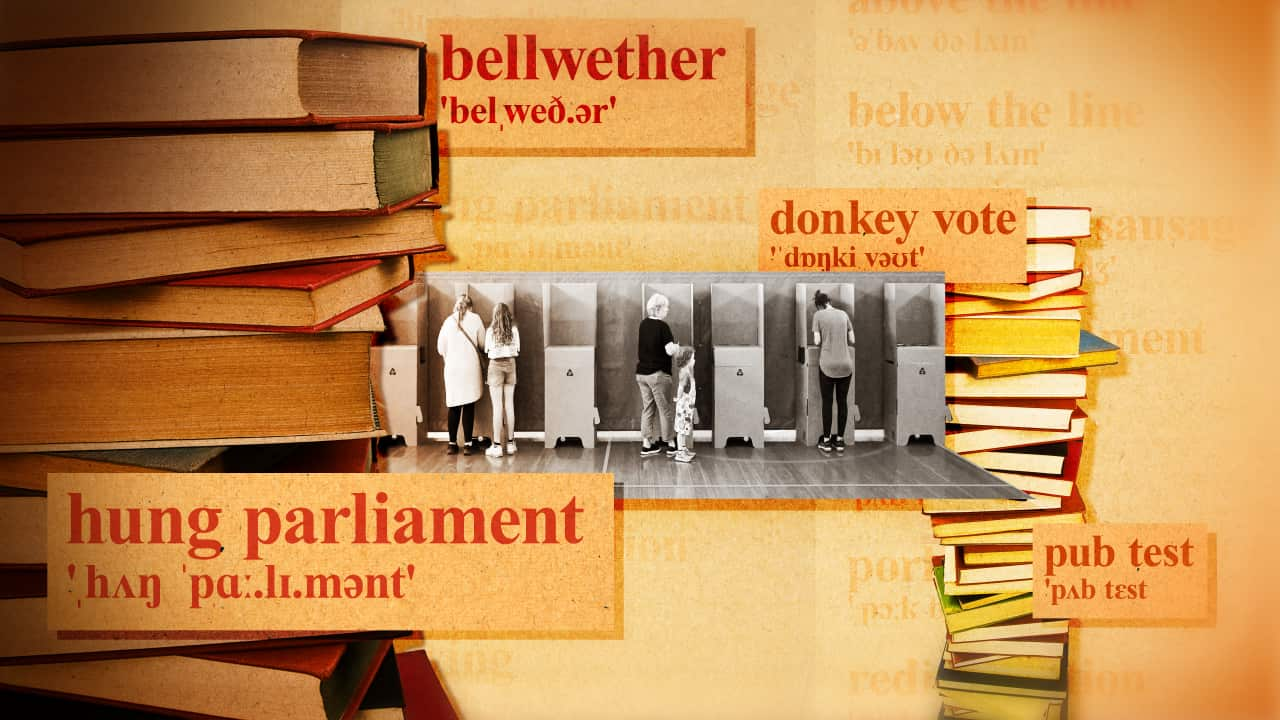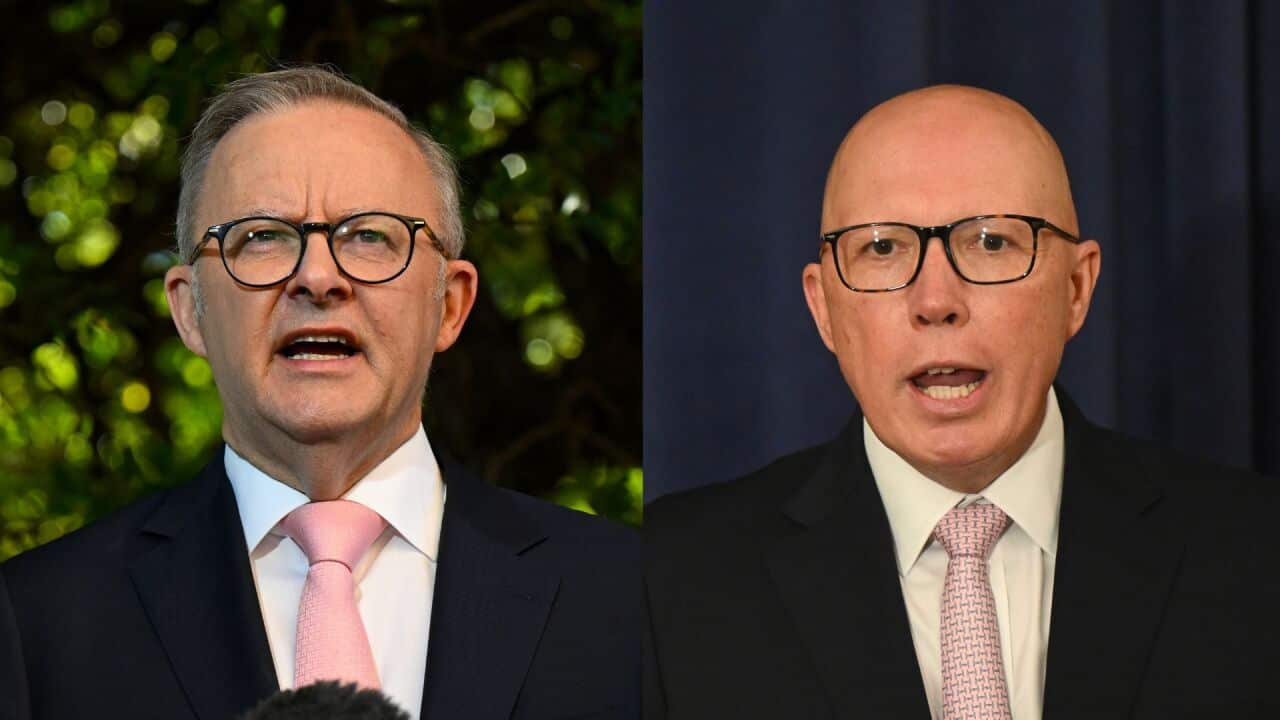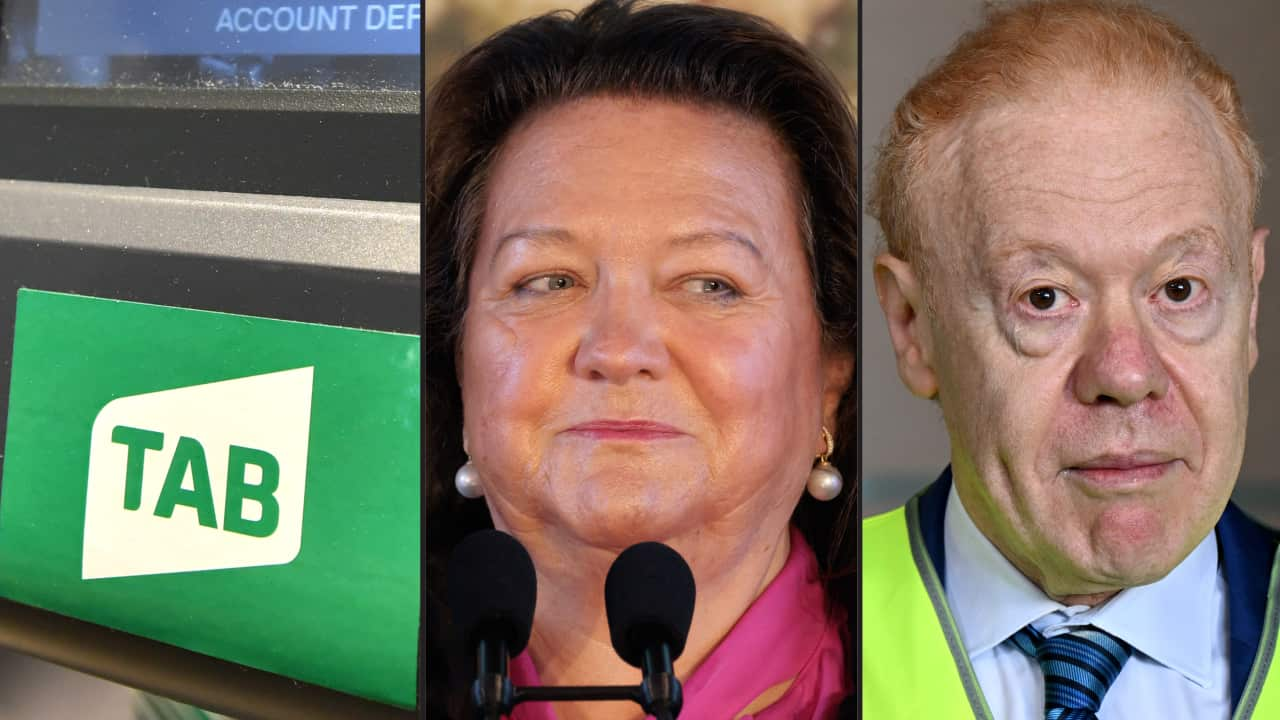With federal elections comes a whole lot of political jargon and slang that can be confusing.
While some of the lingo, like democracy sausage, is distinctly Australian, other terms were adopted from other nations.
Here are some commonly used words and phrases you'll likely hear during the election, and what they mean.
What does above the line/below the line mean?
Voting above the line is one of two ways you can fill out your Senate ballot paper.
To vote above the line, you need to number at least six party or group boxes, starting with 1 for your first choice, 2 for your second choice, and so on until you reach at least 6.
When you use this method, you can't vote for individual candidates, only political parties or groups. They are given control over the order in which your preferences are distributed among their candidates.
Your preferences will first be distributed to the candidates in the party or group of your first choice in the order they appear on your ballot paper, then to the candidates in the party or group of your second choice and so on, until they have all been distributed.

This mock Senate ballot shows how to vote above the line. Source: Supplied / AEC
If you choose to use this method, you need to number at least 12 individual candidate boxes, starting with 1 for your first choice, 2 for your second choice, and so on until you reach at least 12.
Voting below the line is the only way you can preference individual candidates over others, rather than the parties deciding that order for you.
Some candidates relegated to seemingly unwinnable spots on their party's Senate ticket have managed to get elected after running campaigns encouraging people to vote below the line.

This mock Senate ballot shows how to vote below the line. Source: Supplied / AEC
What is a bellwether seat?
A bellwether is an electorate that consistently elects a local member from the political party that ends up forming the government.
Pollsters can look to them to discern trends and predict the outcome of an election, but the close nature of the results in bellwether seats means it may not become clear on election night.
Robertson on the NSW Central Coast has been won by a candidate from the party that's formed government every election since 1983, making it the longest-held bellwether seat.
What is the Coalition?
In Australia, the long-running political alliance between the Liberal Party and the National Party is often referred to as the Coalition.
Together, they are considered one of the two major parties in federal politics, alongside Labor.
While members of the Coalition sit next to each other in parliament and generally vote the same way, the Liberals and Nationals hold separate party meetings and elect their own party leaders.
As the Liberal Party is the larger of the two, its leader serves as prime minister when the Coalition is in government and as Opposition leader when it isn't.
What is a corflute?
A corflute is a type of temporary plastic sign used in Australian election campaigns to advertise a candidate or political party.
They're typically printed with a candidate's photo, name, and party affiliation (if they have one).
You'll usually see them attached to people's fences or on poles in front yards in the lead-up to the election, and outside polling places on voting day.
What is the crossbench?
The crossbench is a term used to refer to MPs and senators who aren't members of the government or Opposition.
They can be members of minor parties like the Greens, or independents.
Crossbenchers are given that name because they sit on the benches that cross the House of Representatives and Senate chambers.

Independent and minor party MPs are called crossbenchers because of where they sit in the chambers of parliament. Source: AAP / Lukas Coch
What is a democracy sausage?
Sausage sizzles have been a staple at many polling booths in Australia for decades, often sitting alongside cake stands as a way to raise money for local schools and community groups.
But describing a snag in bread with onion and tomato sauce sold at them as a "democracy sausage" is much newer.
According to the Museum of Australian Democracy, the term was coined around 2010 when a group of friends created the Snag Votes website, listing and mapping the polling places in Brisbane holding sausage sizzles.
It was then selected as the Australian National Dictionary Centre's word of the year in 2016.
Perhaps the most famous instance of someone eating a democracy sausage was in 2016 when the then-Labor leader Bill Shorten took a bite from the middle of his snag instead of the end. Controversially, his sausage was also served on a roll rather than a traditional single slice of white bread.

Bill Shorten confounded many Australians on election day in 2016 when he took a bite out of the middle of his democracy sausage. Source: AAP / Mick Tsikas
What is a donkey vote?
A common misconception is that the term "donkey vote" refers to an informal, throwaway vote.
It's actually a valid way of voting that simply involves numbering the candidates from top to bottom or bottom to top in the order in which they appear on the ballot paper.
For example, if four candidates are running in your electorate and you put a 1 in the box next to the first one's name, a 2 in the second box, a 3 in the third box, and a 4 in the fourth box — you've done a donkey vote.
To lessen the effect of donkey votes on election results, candidates' names are listed on ballot papers in random orders.
What are how to vote cards?
Given their name, it may sound like 'how to vote cards' are a helpful guide that simply tells you how to fill in your ballot paper correctly to ensure your vote counts.
What they actually are, are the flyers handed out at polling booths by party and campaign workers that suggest the number that voters should place next to each candidate on their ballot paper.
You're under no obligation to follow the order listed on how to vote cards and not doing so won't necessarily impact the likelihood of the candidate you give your first preference to being elected.
What is a hung parliament?
A hung parliament occurs when no political party or coalition of parties, like the Liberal-Nationals, secures a majority of seats in the House of Representatives.
When this happens, no party is able to pass bills in the lower house without gaining support from the crossbench or other parties, giving them the balance of power.
The last time we had a hung parliament at a federal level was in 2010, when Labor and the Coalition both won 72 seats each, the Greens secured one, and four independents were elected.

A hung parliament is when no party or coalition of parties wins at outright majority at an election. Source: AFP
What are hustings?
Hustings is just another name for the activities politicians undertake before an election in an effort to get people to vote for them.
These activities include things like making speeches and policy announcements, meeting constituents, and participating in debates.
If you hear someone say that Anthony Albanese or Peter Dutton is "on the hustings", it just means they're campaigning.
What is an incumbent?
Outside an election, the incumbent is the current holder of a political position.
During an election, it is the person who held a political position before the election was called, regardless of whether they are seeking re-election.
For example, Anthony Albanese is the incumbent prime minister and Member for Grayndler.
What is an informal vote?
If you don't fill in your ballot paper correctly — or at all — it's called an informal vote.
The Australian Electoral Commission (AEC) considers a ballot paper to be informal if:
- it is blank or unmarked
- it does not indicate the voter's first preference for 1 candidate and an order of preference for all the remaining candidates (for the House of Representatives)
- ticks or crosses have been used
- it has writing on it that identifies the voter
- a number is repeated
- the voter's intention is not clear, or
- it has not been appropriately authenticated
If you make a mistake on your ballot paper, you can always ask staff at the polling booth for another one.

It's important to fill your ballot paper in correctly or your vote won't count. Source: AFP / Peter Parks via Getty Images
What is majority government/minority government?
When either Labor or the Coalition secures an outright majority — at least 76 seats — in the House of Representatives, they can form a majority government.
This means that they don't need the support of any other MPs or parties to pass bills in the lower house.
When an election delivers a hung parliament, Labor or the Coalition can form a minority government by securing support from enough independent or minor party MPs to give them a majority on the floor of the lower house.
Julia Gillard formed a minority Labor government in 2010 after making a formal agreement with the Greens and reaching confidence and supply deals with three independent MPs.
What is a marginal seat?
A seat is considered by the AEC to be marginal when the elected candidate received less than 56 per cent of the vote at the previous election.
When a seat is marginal, it's at risk of being lost to another candidate.
The most marginal seat in the country is Deakin in Melbourne's outer-east, which Liberal MP Michael Sukkar holds by just 0.02 per cent.
What is pork-barrelling?
When governments and politicians allocate public funding and resources to projects based on their electoral interests rather than public needs or interests, it's called pork-barrelling.
Pork-barrelling is a long-standing practice and is typically used to try to win votes in marginal seats.
There are no laws specifically banning the practice in Australia, but research shows the majority of voters consider it to be a form of corruption.
What is a pre-poll?
If you cast your ballot at an early voting centre before the day of the election, it's considered a pre-poll.
You're eligible to vote early if you:
- are outside the electorate where you are enrolled to vote
- are more than 8km from a polling place
- are travelling
- are unable to leave your workplace to vote
- are seriously ill, infirm or due to give birth shortly (or caring for someone who is)
- are a patient in a hospital and can't vote at the hospital
- have religious beliefs that prevent you from attending a polling place
- are in prison serving a sentence of less than three years or otherwise detained
- are a silent elector
- have a reasonable fear for your safety or wellbeing
What are preference deals?
Preference deals are simply the agreements political parties make about where they will put each other's candidates on their how to vote cards.
That means that unless voters choose to follow how to vote cards when filling out their ballots, preference deals don't have any impact on election results.
What is the pub test?
The 'pub test' is a colloquial term that refers to a measure for judging public opinion on policies, proposals, decisions, and candidates.
If you hear someone saying something "doesn't pass the pub test", it essentially means it's not something that the average Australian would think is a good idea.
What is redistribution?
When electoral boundaries are redrawn to ensure there are roughly the same numbers of voters in each seat, it's called a redistribution.
Parts of Victoria, NSW, and Western Australia underwent a redistribution in 2024 to reflect changes in each state's population.
The boundaries of all federal electorates in WA, 42 in NSW, and 34 in Victoria were altered.
The seat of Higgins in Melbourne's inner south-east was abolished, as was North Sydney, while a new electorate called Bullwinkel was created in Perth's east.

Both Kylea Tink's (left) and Michelle Ananda-Rajah's (right) electorates were abolished due to redistribution. Source: AAP
What is a safe seat?
A seat where the elected candidate received more than 60 per cent of the vote at the previous election is considered by the AEC to be 'safe'.
That means there would need to be a big swing against the incumbent MP for them to lose their seat.
What is swing?
A swing is the difference between the percentage of the vote a candidate or party secured at one election compared to another.
If there's a swing away from a party or candidate, it means they received fewer first-preference votes at this election than they did at the last one.
If there's a swing towards them, they received more first-preference votes this election than the previous one.
A swing voter is someone who changes which party or candidate they vote for between elections.
What are teals?
The word 'teal' has long been synonymous with a blue-green colour, but it took on a new political meaning during the 2022 federal election.
It was the name given to a group of mostly female, independent candidates running in formerly safe Liberal seats on a platform of stronger climate action and greater integrity in politics.
They were labelled 'teals' by the media because many of the candidates used the colour in their campaign branding.
Most teals also received the support of the fundraising group Climate 200.



